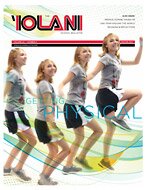This Issue
Winter 2012 - Department | Headmaster’s Column
Headmaster’s Column
What we are experiencing is, in a metaphorical sense, a reversal of the early trajectory of civilization: we are evolving from being cultivators of personal knowledge to being hunters and gatherers in the electronic data forest.
The Shallows - What the Internet is Doing to our Brains by Nicholas Carr

With a few notable exceptions, schools have embraced technology as an important, if not critical element in education. Laptop schools were the craze a decade ago. Other schools, such as ‘Iolani, took a more moderate course employing computer labs and laptop carts. Smart boards, E-Beam, Promethean Boards, Mimeo and LCD projectors also have their uses. We, like most schools, endorse the use of technology as part of our pedagogy.
As we enjoy the Net’s bounties, are we sacrificing our ability to read and think deeply?
The next generation of Internet tools is now upon us. Tablets, smart phones and other devices are now knocking on our classroom doors, and teachers are discovering effective ways to use them. Moore’s Law predicts the doubling of computer power every eighteen months; therefore we will undoubtedly continue to add to our technological arsenal and to develop new educational strategies. But we do so with care and caution. The pace and magnitude of these changes prompts one to ask, as Nicolas Carr asked: Is all this easy access good for our students and their learning?
To a large extent, we cannot, and should not, stand in the way of progress. Technological advances have changed the way we communicate, socialize and share information. Print, voice and video all come to us through the internet, and to ignore its effect on our lives, or not to leverage its power for our benefit would be foolhardy.
We should, however, also be aware of Mr. Carr’s argument that that these developments have altered people and the ways they learn.
Carr, in his book The Shallows-What the Internet is Doing to our Brains, lays out a compelling and well-researched case describing how the Internet has changed the physical connections of our brain and consequently, our thinking, learning and behavior patterns. In citing Patricia Greenfield, a prominent developmental psychologist at UCLA, Carr writes:
She concluded that “every medium develops some cognitive skills at the expense of others.” Our growing use of the Net and other screen-based technologies has led to the “widespread and sophisticated development of visual-spatial skills.” But our “new strengths in visual-spatial intelligence” go hand in hand with a weakening of our capacities for the kind of “deep processing” that underpins “mindful knowledge acquisition, inductive analysis, critical thinking, imagination, and reflection.”
Do today’s evermore dazzling tools for communication and research weaken the ability to think widely, deeply and imaginatively?
We should, however, also be aware of Mr. Carr’s argument that that these developments have altered people and the ways they learn.
Sound bites, embedded links, email alerts, search engines and other applications allow us to multitask. A wealth of information is at our fingertips. But these tools must not distract us from developing our abilities to focus, to think and to organize all the data we confront. If we allow technology to affect our ability to apply what we learn to solve problems, to integrate knowledge in new ways, to be creative or to communicate effectively, we will not have fulfilled our educational mission.We will continue to challenge ourselves and work to find the proper balance between the uses of technology and the independent development of deep thinking processes that will prepare our students to meet the challenges of the 21st Century. Fortunately, our students and their teachers don’t like staying in the shallows.


